Db – Que ninguno se aparte de la gracia de Dios 12: 12-17
Que ninguno se aparte de la gracia de Dios
12: 12-17
Que ninguno se aparte de la gracia de Dios ESCUDRIÑAR: ¿Por qué las personas creyentes y no creyentes, se apartan de la gracia de Dios? ¿Dónde comenzó este “apartarse”? ¿De qué culpa la gente a YHVH por el caos en sus vidas, que es el resultado de su propio pecado? ¿Cómo se relacionan estas amonestaciones con disciplinar a los miembros más débiles de las congregaciones? ¿Cuán importante es la paz en las congregaciones de Dios?
REFLEXIONAR: ¿Cómo le va en su carrera de fe? ¿Necesita ánimo para resistir, para ser persistente o para vigilarse? ¿Cómo puede orar a Adonai ELOHIM esta semana para que le ayude a volver al camino correcto? ¿Cuándo fue la última vez que se apartó del Señor? ¿Cómo reacciona usted? ¿Se golpea a sí mismo? ¿O se levanta, se reconcilia con el Señor y continúa en la carrera? ¿Cuál de estas instrucciones es la más importante para usted hoy? ¿Por qué? ¿Qué le consuela en este pasaje? ¿Qué le inquieta? ¿Por qué?
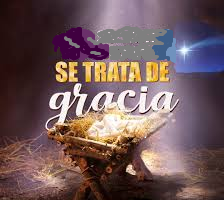
La idea básica de este pasaje es claramente animar a la comunidad mesiánica. El propósito no era enseñar, porque ya habrían tenido una buena comprensión intelectual del evangelio, sino animarlos a vivir de acuerdo con la verdad que ya conocían: creerla, seguirla, confiar en ella y obedecerla. La verdad que se conoce, pero no se obedece, se convierte en un juicio para nosotros en lugar de una ayuda. Enseñar y animar son inseparables. Enseñar la sana doctrina que no se aplica no sirve de nada, y animar sin basarse en la sana doctrina es arena movediza. El método de instrucción de Dios es simple: explicarnos los principios espirituales y luego ilustrarnos y alentarnos a su aplicación. Por lo tanto, Hebreos 12 también comienza con palabras de aliento. Después de que la fe ha sido cuidadosamente explicada, definida e ilustrada, es como si el escritor estuviera diciendo: “Ahora que sabe de qué se trata correr la maratón del creyente: ¡salga y corra!” No es suficiente conocer que el Brit Hadashah es mejor; debemos aceptarlo para nosotros mismos. No basta saber que el Mesías es superior y nuestro Perfecto Sumo Sacerdote; debemos confiar en Su sacrificio expiatorio. No basta saber cómo debemos vivir; debemos vivir realmente lo que sabemos.373
Estos versículos dan tres alientos: para resistir, para perseverar y para vigilar. Se dirigen en primer lugar a los creyentes, aunque también se aplican a los incrédulos. Es como si el autor estuviera diciendo: “Sobre la base de que debe estar en el maratón de los creyentes para ganar la carrera de la fe, y que su sufrimiento es parte de la amorosa disciplina de Dios para su bien, aquí hay tres cosas en las que usted debe concentrarse en hacer”.
Resistencia: Estos versos retoman la metáfora de la carrera. Lo primero que le sucede a los corredores cuando empiezan a cansarse es que se les caen los brazos. La segunda cosa, son las rodillas. Pero concentrarse en brazos débiles y rodillas débiles solo lo ralentiza. La única forma en que puede esperar continuar es enfocándose en la meta. Asimismo, cuando experimentamos brazos débiles espirituales y rodillas débiles, nuestra única esperanza es poner los ojos en Jesús, el Autor y Consumador de la fe (Hebreos 12:2c citando Habacuc 2:4).
El escritor de Hebreos obtuvo su metáfora de Isaías. Por lo tanto, “fortaleced las manos debilitadas y las rodillas paralizadas” (Hebreos 12:12 citando a Isaías 35:3). Los fieles de Israel habían pasado por mucho. Tuvieron muchos reyes malvados, algunos falsos profetas, compatriotas israelitas generalmente desobedientes y obstinados, enemigos poderosos que los amenazaban, y parecía que no había perspectivas de que todos vivieran en paz en su propia Tierra. Estaban desanimados y abatidos, listos para darse por vencidos. Así que el profeta les recordó el Reino mesiánico venidero, cuando dijo ¡Alégrense el desierto y el sequedal! ¡Regocíjese el Arabá y florezca como el lirio… …Sí, ellos verán la gloria de YHVH, La majestad de nuestro Dios (Isaías 35:1-2). Dios les ordenó que se ayudaran unos a otros para que perseveraran: Fortaleced las manos débiles y afianzad las rodillas vacilantes. Decid a los de corazón tímido: Esforzaos, no temáis. He aquí, vuestro Dios viene con venganza; la retribución1 vendrá de Dios mismo, mas Él os salvará (Isaías 35:3-4). Luego le dio a Israel una forma de reconocer al Rey de Reyes cuando llegó (vea el comentario sobre Isaías Gl – Los Tres Milagros Mesiánicos). Era como si Él estuviera diciendo, “No se rindan ahora. Soporten, se acerca un día mejor. Fíjense en eso y tendrán el ánimo y la fuerza que necesitan. La victoria está por delante”. Anímense unos a otros, y tanto más cuando vean el Día del Señor (vea el comentario sobre Isaías Kg – Se acerca la Segunda Venida de Jesucristo a Bosra (10:25).
…y haced sendas derechas para vuestros pies, para que no se disloque lo cojo, sino más bien que sea sanado (12:13). Las sendas derechas se refieren a permanecer en su propio carril en la carrera. Cuando se sale de su carril, no solo se descalifica a sí mismo, sino que a menudo interfiere con otros corredores. Un corredor nunca se sale de su carril intencionalmente; sólo lo hace cuando está distraído o descuidado, cuando pierde la concentración de la meta, o cuando el cansancio le quita la voluntad de ganar. Tus ojos miren de frente, Y ábranse tus párpados hacia lo que está delante. Examina la senda de tus pies, Y sean rectos todos tus caminos. No te desvíes a diestra ni a siniestra, Aparta tu pie del mal (Proverbios 4:25-27). Cuando emprendemos la carrera de la fe, nada debe distraernos o hacernos vacilar o cambiar de rumbo. Si lo hacemos, no solo tropezaremos nosotros mismos, sino que también haremos que otros tropiecen.374
…para que no se disloque lo cojo, sino más bien que sea sanado (12:13b), aquellos judíos incrédulos que entendieron quién era el Mesías pero que no habían cruzado la línea del conocimiento a la fe, no sean incapacitados, sino sanados o salvos (Hebreos 12:13 citando Proverbios 4:26). La palabra cojo (griego: colos) se encuentra solo en los evangelios sinópticos y Hechos, y se usa principalmente en un sentido literal. Sin embargo, aquí se usa metafóricamente. En 1 Reyes 18:21 (LBLA) leemos: Elías se acercó a todo el pueblo y dijo: ¿Hasta cuándo vacilaréis entre dos opiniones? Si el SEÑOR es Dios, seguidle; y si Baal, seguidle a él. Pero el pueblo no le respondió ni una palabra. Pero en la Septuaginta, la traducción griega del TaNaJ, usa la misma palabra (griego: colos) en 1 Reyes 18:21 que el escritor usa en Hebreos 12:13. Por lo tanto, la palabra aquí habla de cojera espiritual, en particular, de aquellos que entre la congregación mesiánica fueron los más afectados por las persecuciones y que estaban a punto de volver al Templo y a los sacrificios levíticos.
El aliento fue para los judíos nacidos de nuevo que habían dejado el Templo para resistir y aferrarse tan tenazmente a su nueva fe, de tal manera que aquellos vacilantes fueran animados a pasar a la fe en el Mesías como su Sumo Sacerdote superior. Se advirtió a los judíos creyentes que, si avanzaban cojeando en la carrera de la fe, los que estaban al borde de la salvación tropezarían y se saldrían de su camino. Esos judíos incrédulos habían comenzado la carrera hacia la salvación al salir del Templo, pero necesitaban el ejemplo y el testimonio alentador de los judíos salvos para soportar y terminar la carrera para que no quedaran discapacitados espiritualmente, sino sanados (salvados).375
Persistencia: Seguid la paz con todos, y la santidad, sin la cual nadie verá al Señor (12:14). Aquí comienza la advertencia que culminará en 12:29, porque en verdad, “Nuestro Dios es fuego consumidor”. Los que no prestan atención, que suponen que el mero reconocimiento intelectual de la existencia de Dios y el mesianismo de Yeshua, los llevaría al cielo sobre la base de sus buenas obras, tendrán un duro despertar porque el que no fue hallado inscrito en el libro de la vida, fue lanzado al lago de fuego (Apocalipsis 20:15).376
Mirando bien que ninguno se aparte de la gracia de Dios, que ninguna raíz de amargura brotando os impida, y por ella muchos sean contaminados;( 12:15 RV1909).
Vigilando: Mirando bien (12:15a), se traduce de la palabra griega episkopeo, que está estrechamente relacionada con episkopos, que significa supervisor y es sinónimo de anciano . Debemos cuidarnos los unos a los otros, ayudándonos unos a otros a crecer en santidad. También debemos cuidar, supervisar a aquellos en nuestro medio, especialmente con la iglesia o comunidad mesiánica, que pueden no ser creyentes. No debemos juzgar, sino ser sensibles y preocupados por las oportunidades de presentarles las afirmaciones de Jesucristo. Y dado que la carta a los Hebreos habla tan a menudo de tales personas en la comunidad mesiánica en la diáspora, este es un punto clave.
…se aparte de la gracia de Dios (12:15b), lo que significa llegar tarde, quedarse fuera. Si un incrédulo muere antes de confiar en Jesús (Yeshua el Mesías de Israel), él o ella se perderá por toda la eternidad, sin la gracia de ADONAI. Nosotros somos animados a velar, a estar atentos, a que, en la medida en que podamos influir en ellos, nadie a nuestro alrededor viva con la ilusión de ser creyente cuando no lo es, o que nadie expuesto al evangelio se aparte de él (Mateo 7:21-23; 1 Juan 2:19).377
Que ninguna raíz de amargura brotando os impida, y por ella muchos sean contaminados (Hebreos 12:15c citando Deuteronomio 29:18). Al presentar el pacto a todo Israel en Deuteronomio 29:1, Moisés advirtió: no sea que haya entre vosotros hombre o mujer, familia o tribu, cuyo corazón se aparte hoy de YHVH nuestro Dios, para ir a servir a los dioses de esas naciones. No sea que haya entre vosotros una raíz que produzca hiel y ajenjo (Deuteronomio 29:18), en lugar de producir fruto apacible de justicia (como se encuentra en 12:11). Según la ley de Moisés debían saber que: Pues sucederá que si no obedeces la voz de YHVH tu Dios, cuidando de practicar todos sus mandamientos y estatutos que yo te ordeno hoy, vendrán sobre ti y te alcanzarán todas estas maldiciones (Deuteronomio 28:15-69). Y sucederá que cuando él oiga las palabras de esta maldición, se envanecerá, diciendo: “Tendré paz aunque ande en la terquedad de mi corazón, a fin de destruir la tierra regada junto con la seca.” El SEÑOR jamás querrá perdonarlo, sino que la ira del SEÑOR y su celo arderán contra ese hombre, y toda maldición que está escrita en este libro caerá sobre él, y el SEÑOR borrará su nombre de debajo del cielo (Deuteronomio 29:19-20).378
Vigilando que no haya ningún fornicario, o profano, como Esaú, que por una comida vendió su primogenitura (12:16). Quizás la persona más triste y más impía de la Biblia fuera de Judas es Esaú. Superficialmente, sus actos contra YHVH no parecen tan malvados como los de muchos paganos brutales y sin corazón. Pero las Escrituras los condenan fuertemente. Tenían mucha luz y tuvieron todas las oportunidades posibles, como cualquier persona en su época, de conocer y seguir a ADONAI. Conocían Su palabra, habían oído Sus promesas, habían visto Sus milagros y tenían comunión con Su pueblo; sin embargo, con obstinación determinada le dieron la espalda a Dios y a las cosas de Dios.
Esaú no solo era inmoral, sino que era profano y fornicario. Según John MacArthur no tenía ética ni fe, ni escrúpulos ni reverencia. No tenía respeto por lo bueno, lo veraz o lo divino. Era totalmente mundano, totalmente secular y totalmente blasfemo. Y como resultado, era totalmente inepto para la bendición patriarcal. Por eso ADONAI le dijo a Rebeca que el mayor servirá al menor (Génesis 25:23b) , y por eso actuó como lo hizo (vea el comentario sobre Génesis Gn – Entonces Jacob le dio a Esaú un guiso de lentejas y Esaú menospreció su primogenitura). Los creyentes deben tener cuidado de que nadie como Esaú contamine el Cuerpo del Mesías. Mirad que no haya ningún fornicario o profano como Esaú.379
Porque sabéis que aun cuando (Esaú) después deseaba heredar la bendición, fue rechazado (porque no halló lugar de arrepentimiento), aunque solícitamente la buscó con lágrimas (12:17). Aunque parece que Esaú tuvo un cambio de corazón entre Génesis 25:27-34 y Génesis 27:30-41, no persuadió a su padre Isaac para que lo bendijera con la bendición reservada para el hijo primogénito, porque una vez que la bendición fue dado no podía ser retirada. Aunque Esaú cambió de opinión, no hay indicios de que alguna vez se arrepintiera verdaderamente. Sus lágrimas no habrían brotado por la tristeza que es según Dios, y causa arrepentimiento para salvación sin remordimiento, pero la tristeza del mundo produce muerte (Segunda Corintios 7:10). Más bien, su cambio de corazón fue solo al valorar sus derechos como primogénito (Génesis 27) en lugar de despreciarlos (Génesis 25). Esaú quería desesperadamente la bendición de Dios, pero no en los términos de Dios. Sin embargo, no hay base para inferir de este pasaje que puede ser “demasiado tarde para arrepentirse”, demasiado tarde para que una persona se vuelva del pecado a Dios. Tal actitud es sólo una excusa para seguir pecando. Amado, ¡nunca es demasiado tarde! Los brazos de ADONAI están siempre abiertos, siempre está Su deseo: El Señor no retarda la promesa, como algunos la consideran tardanza, sino que es paciente hacia vosotros, no queriendo que ninguno perezca, sino que todos procedan al arrepentimiento (Segunda Pedro 3:9).380
PÁGINA SIGUIENTE: El Sinaí Terrenal y el Sión Celestia Dc






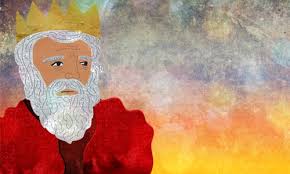
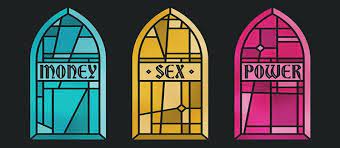
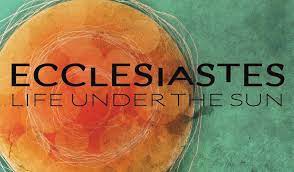
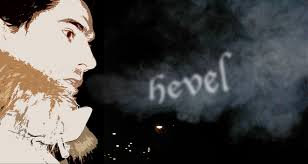



 Las figuras retóricas son herramientas de enseñanza efectivas y se usan a menudo en la Biblia. Varias veces se compara la vida de un creyente con la guerra. El apóstol Pablo (rabino Saulo) nos aconseja que soportemos las penalidades: Comparte sufrimientos como buen soldado de Jesús el Mesías (Segunda Timoteo 2:3) y que nos revistamos de toda la armadura de Dios, para que podáis estar firmes contra las asechanzas del diablo (Efesios 6:11). También usa el boxeo como comparación: boxeo no como golpeando el aire (Primera Corintios 9:26; Segunda Timoteo 4:7). A menudo se habla del creyente como de un siervo de Jesús el Mesías. Pablo frecuentemente se refiere a sí mismo como esclavo o siervo de Cristo (Romanos 1:1; Filipenses 1:1; Tito 1:1). Jesús habló de sus seguidores como luz y sal de la tierra (Mateo 5:13-16). Pedro se refiere a los creyentes como niños y como piedras vivas (Primera de Pedro 2 y 5). Pero al apóstol Pablo (rabino Saulo) le gustaba especialmente la figura de una carrera. Usa frases como correr la carrera (Primera Corintios 9:24), correr bien (Gálatas 5:7) y correr en vano (Filipenses 2:16). Esta es también la figura que usó el escritor de Hebreos para los judíos a quienes se animaba a correr con paciencia la carrera que nos es puesta delante (12:1c-2a).358
Las figuras retóricas son herramientas de enseñanza efectivas y se usan a menudo en la Biblia. Varias veces se compara la vida de un creyente con la guerra. El apóstol Pablo (rabino Saulo) nos aconseja que soportemos las penalidades: Comparte sufrimientos como buen soldado de Jesús el Mesías (Segunda Timoteo 2:3) y que nos revistamos de toda la armadura de Dios, para que podáis estar firmes contra las asechanzas del diablo (Efesios 6:11). También usa el boxeo como comparación: boxeo no como golpeando el aire (Primera Corintios 9:26; Segunda Timoteo 4:7). A menudo se habla del creyente como de un siervo de Jesús el Mesías. Pablo frecuentemente se refiere a sí mismo como esclavo o siervo de Cristo (Romanos 1:1; Filipenses 1:1; Tito 1:1). Jesús habló de sus seguidores como luz y sal de la tierra (Mateo 5:13-16). Pedro se refiere a los creyentes como niños y como piedras vivas (Primera de Pedro 2 y 5). Pero al apóstol Pablo (rabino Saulo) le gustaba especialmente la figura de una carrera. Usa frases como correr la carrera (Primera Corintios 9:24), correr bien (Gálatas 5:7) y correr en vano (Filipenses 2:16). Esta es también la figura que usó el escritor de Hebreos para los judíos a quienes se animaba a correr con paciencia la carrera que nos es puesta delante (12:1c-2a).358 Para un judío convertirse en creyente en el primer siglo siempre fue costoso. A menudo le costó sus amigos, su familia, los privilegios de la sinagoga, el trabajo, el estatus social y el respeto de la comunidad. Quizás algunos de los judíos al borde de la salvación que recibieron esta carta a los Hebreos fueron tentados a regresar a Jerusalén y al antiguo sistema de sacrificios levíticos. En este capítulo se muestra a tales judíos vacilantes que no eran como ellos, los
Para un judío convertirse en creyente en el primer siglo siempre fue costoso. A menudo le costó sus amigos, su familia, los privilegios de la sinagoga, el trabajo, el estatus social y el respeto de la comunidad. Quizás algunos de los judíos al borde de la salvación que recibieron esta carta a los Hebreos fueron tentados a regresar a Jerusalén y al antiguo sistema de sacrificios levíticos. En este capítulo se muestra a tales judíos vacilantes que no eran como ellos, los
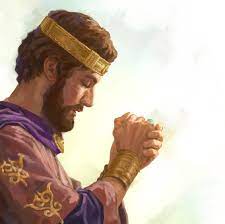
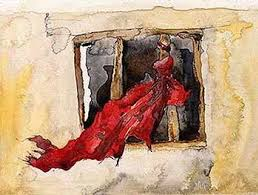 Rahab escondió a los espías y los ayudó a escapar. A cambio, pidió que ella y su familia se salvaran cuando la ciudad fuera tomada. Sus palabras a los espías nos dan una visión única de la diferencia entre el miedo y la
Rahab escondió a los espías y los ayudó a escapar. A cambio, pidió que ella y su familia se salvaran cuando la ciudad fuera tomada. Sus palabras a los espías nos dan una visión única de la diferencia entre el miedo y la 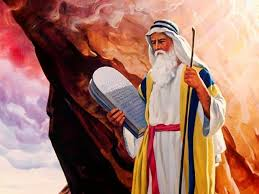 Moisés vivió la mayor parte de su vida, antes de la entrega de la Torá en el Monte Sinaí. Pero incluso antes de que la Torá hubiera sido entregada en el Monte Sinaí, él creía en YHVH y vivía por
Moisés vivió la mayor parte de su vida, antes de la entrega de la Torá en el Monte Sinaí. Pero incluso antes de que la Torá hubiera sido entregada en el Monte Sinaí, él creía en YHVH y vivía por